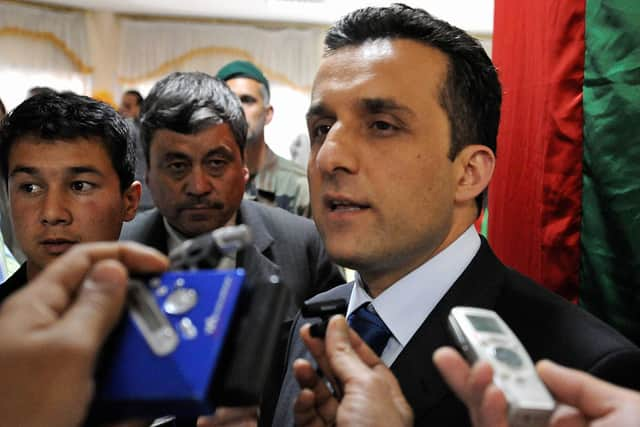Panjshir: is Afghanistan valley Taliban ruled, resistance explained, who is Amrullah Saleh - and has he fled?
and live on Freeview channel 276
It had been the final Afghan stronghold to resist being seized by the Taliban, but now reports suggest Panjshir has finally fallen to the group.
However, contradicting accounts claim anti-Taliban forces are still holding out and remain in control.
Advertisement
Hide AdAdvertisement
Hide AdIf the latter is true, it remains perhaps the last province not controlled by the Taliban, a symbolic stronghold of hope for Afghanistan’s people.
But on 6 September, the Taliban said the area "has been cleared today completely", after military forces were sent in to get rid of the final pocket of “terrorism”.
Here is everything you need to know about it.
Where is Panjshir?
Panjshir is one of Afghanistan’s 34 provinces, and is located in the northeastern part of the country.
Its population is estimated to be around 173,000 people, and the Panjshir Valley that lies at the province’s heart is a strategic sticking point for anti-Taliban forces.
Who is in control?
Advertisement
Hide AdAdvertisement
Hide AdOn Monday 6 September, a Taliban spokesperson declared victory for the Islamist group, but resistance fighters said they were still present in "all strategic positions" and will "continue to fight".
"The Taliban haven't captured Panjshir, I am rejecting Taliban claims," Ali Maisam, spokesperson for the National Resistance Front of Afghanistan (NRF), told the BBC.
A tweet from the group's Twitter also said: "The struggle against the Taliban & their partners will continue until justice & freedom prevails."
Pictures on social media have shown Taliban fighters in front of the gate of the provincial governor’s compound, but these images have not yet been verified.
Advertisement
Hide AdAdvertisement
Hide AdThe Taliban have said the people who were in control of Panjshir are “missing at the moment”.
Why is there resistance there?


While many of Afghanistan’s other provinces fell relatively easily into the control of the Taliban, Panjshir is - according to some reports - still fighting back.
Following the Fall of Kabul on 15 August, anti-Taliban forces loyal to the Islamic Republic of Afghanistan fled to Panjshir and formed the NRF.
The rugged mountain valley was a centre of resistance when Afghanistan was under Soviet occupation in the 1980s, and during the Taliban's previous period of rule, between 1996 and 2001.
Advertisement
Hide AdAdvertisement
Hide AdIn the mid-2000s, the Afghan National Security Forces (ANSF) - newly formed after the overthrowing of the Taliban - and the International Security Assistance Force (ISAF) established several bases in the province.
This could be why anti-Taliban forces have managed to fight back far longer than in other areas, due to more abundant resources left behind by these bases.
Who is Amrullah Saleh?
Amrullah Saleh is an Afghan politician, the former First Vice President of Afghanistan who has since claimed the office of acting president of the country.
An outspoken critic of the Taliban, following the fall of Kabul, Saleh relocated to the Panjshir Valley, where he proclaimed himself the caretaker President of Afghanistan as per the country’s Constitution.
Advertisement
Hide AdAdvertisement
Hide AdHe also announced the formation of an anti-Taliban front with Ahmad Massoud, the son of the late anti-Taliban commander Ahmad Shah Massoud, and former Afghan Defense Minister Bismillah Khan Mohammadi.
In a tweet criticising US President Joe Biden posted on 17 August, Saleh said: "It is futile to argue with @POTUS on Afg now. Let him digest it. We d Afgs must prove tht Afgh isn't Vietnam & the Talibs aren't even remotely like Vietcong.
“Unlike US/NATO we hvn't lost spirit & see enormous oprtnities ahead. Useless caveats are finished. JOIN THE RESISTANCE."
On 6 September, a Taliban spokesperson claimed that Saleh has left Afghanistan and escaped to neighbouring Tajikistan; in a video posted to Facebook a week ago, Saleh rejected claims that he had fled.
Advertisement
Hide AdAdvertisement
Hide AdOn Sunday 5 September, Massoud said he was open to peace talks, and called on the Taliban to end their offensive. The Taliban have since said the resistance gave “negative answers” when they tried to negotiate.
The number of deaths in Panjshir resulting from the conflict is not known, but both sides have reported casualties.
A message from the editor:
Thank you for reading. NationalWorld is a new national news brand, produced by a team of journalists, editors, video producers and designers who live and work across the UK. Find out more about who’s who in the team, and our editorial values. We want to start a community among our readers, so please follow us on Facebook, Twitter and Instagram, and keep the conversation going. You can also sign up to our newsletters and get a curated selection of our best reads to your inbox every day.
Comment Guidelines
National World encourages reader discussion on our stories. User feedback, insights and back-and-forth exchanges add a rich layer of context to reporting. Please review our Community Guidelines before commenting.
